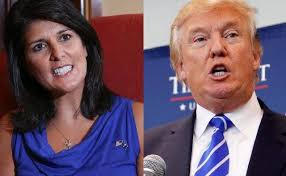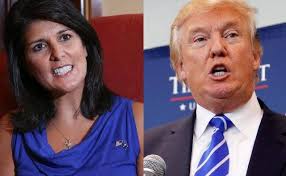Trump has stated in no uncertain terms that he’s against ISIS. He’s awaiting a military review due on Feb. 28 that provides him with options. In addition:
’The president has been very clear that he’s going to work with any country that shares our interest in defeating Isis,’ White House Press Secretary Sean Spicer said on Monday, in his first daily press briefing.
This includes Russia and Syria. Syria’s president in response said that he’d be willing to work with the US to rid Syria of terrorists, but that his government would need to invite such cooperation. Syria has invited Russia but not the US as of now.
Syria’s military continues to defeat the terrorists of all stripes.
Given these facts, it is singularly inappropriate that Trump’s UN ambassador, Nikki Haley, should launch an attack on Syria on chemical weapons grounds and introduce a resolution that Russia will veto. Trump and Haley do not appear to be coordinating their actions.
There is no need at all for the US to escalate its military forces in Syria beyond what Obama has already placed there. That’s because Syria is winning. There is no need for Trump-styled safe zones or any other variety of US engineered safe zones of any description. Syria is resolving the matter of refugees by defeating the terrorists.
What Trump could do, if he really wanted to contribute to stopping ISIS and other terrorists in Syria, would be to switch off their aiders and abettors: Saudi Arabia, Turkey, Israel, Jordan, other Gulf states. He could stop being antagonistic toward Iran, because Iran has forces in Syria that are fighting terrorists every day. He could stop being antagonistic toward Hezbollah for the same reason.
Russia has been willing to work with the US, but the US military has refused. It basically was insubordinate to Obama and/or managed to scuttle any cooperation. So, another thing that Trump could do if killing off ISIS is his goal is to bring the US military into line.
And he could muzzle Nikki Haley, who is coming across as a reincarnation of Samantha Power.
I expect none of this to occur. I do not expect a rational link between Trump’s anti-ISIS goal and his means of attaining those goals to occur. Not only is Haley’s activity inconsistent with it, but so are Trump’s trial balloons of safe zones and an anti-Iran alliance of Israel, Saudi Arabia and the UAE.
Trump is giving us two contradictory directions, plans, and suggestions. In time, we’ll discover more precisely what has priority. Neither of his two paths are any good. One path is to use more US forces against ISIS and create safe zones; the other is stronger confrontation against Assad and Iran through an anti-Iran axis.
Trump is following Obama’s contradictory Syrian policies, more or less. In fact, he’s hardening them. He should be looking for ways to get the US out of the Middle East altogether. That’s the surest way to defuse anti-US sentiment and terrorism. That’s the America First policy he claims to want. It would mean stopping aid to Israel. Trump has fallen all over Israel, however, and so again we see contradiction between two paths: America First and pro-Israel.
As far as I can tell, Trump acts more or less instinctively or by the seat of his pants. Words are cheap to him, and contradictions don’t bother him because of this. His actions are telling us where his instincts are taking the US policies. Because he’s so anti-Iran and so anti-ISIS, he won’t mind introducing more American forces into Syria, no matter what Syrians want. The notion that he’ll work with any country will go out the window because Syria for the Syrians is not on his agenda. To him, there is no contradiction. US force is what counts because all he can see is an evil ISIS. He’s not thinking of the fallout and political ramifications of more deeply involving American forces in this region.
Reprinted with permission from LewRockwell.com.


